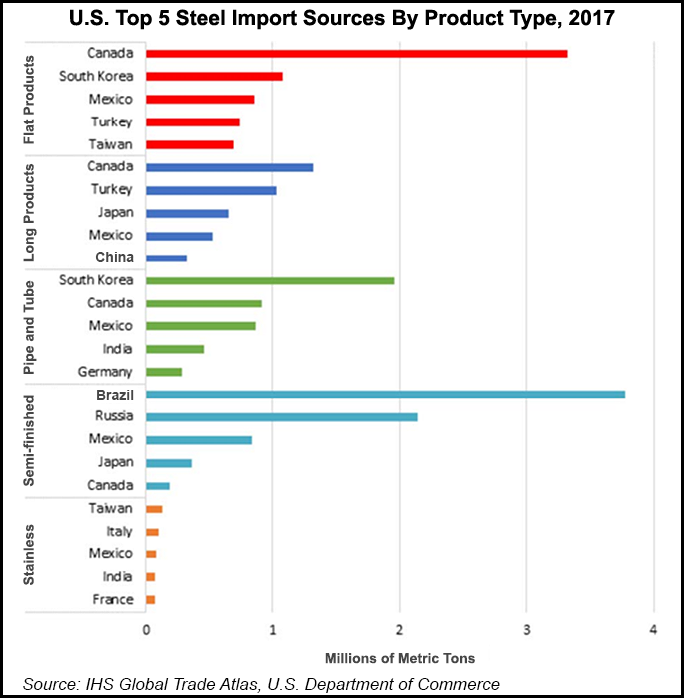Regulatory | NGI All News Access | NGI Mexico GPI
Mexico Strikes Back in WTO Complaint as NAFTA ‘Shift’ Eyed by Trump
Mexico said it would follow the European Union’s (EU) lead and file legal proceedings with the World Trade Organization (WTO) over the Trump administration’s decision last week to impose tariffs on steel and aluminum imports.

Meanwhile, National Economic Council Director Larry Kudlow hinted that Trump would rather conclude separate bilateral trade deals with Canada and Mexico, rather than renegotiate the North American Free Trade Agreement (NAFTA). Also, three nonprofit advocacy groups funded in part by leading Republican backers, the Koch brothers, urged Trump to rescind the new tariffs.
On Monday, Mexico’s Ministry of Economy said the tariffs violate the WTO’s Agreement on Safeguards because they were not enacted according to established procedures. Mexico City also said the tariffs run afoul of similar rules enacted by the WTO’s predecessor, the General Agreement on Tariffs and Trade.
“The Mexican government confirms that its actions will continue to adhere to the state of international commercial law and will be proportional to the damage that Mexico unfortunately receives,” the economy ministry said in a translated statement.
The EU, Canada and Mexico each took retaliatory steps against the United States after the Trump administration imposed a 25% tariff on steel imports and a 10% tariff on aluminum imports last Friday. Brussels filed a complaint with the WTO and announced plans to impose additional duties on American-made products imported by the 28-member bloc. Mexico City and Ottawa also announced similar plans for reciprocal tariffs.
A decree from Mexico’s Ministry of the Interior with Tuesday’s date shows Mexico City plans to levy tariffs on American-sourced pork legs and shoulders, cheese, apples, potatoes, cranberries and whiskey, among other things.
Shift on NAFTA
During an interview Tuesday on Fox & Friends, Kudlow disclosed that he had met with the president at least twice on Monday to discuss trade.
“He is very seriously contemplating kind of a shift in the NAFTA negotiations,” Kudlow said. “His preference now — and he asked me to convey this — is to actually negotiate with Mexico and Canada separately. He prefers bilateral negotiations. He’s looking at two much different countries…they have different problems.”
Kudlow said Trump “believes bilateral [negotiation] has always been better. He hates large treaties. I know this is just three countries, but still, often times when you have to compromise with a whole bunch of countries, you get the worst of the deals. Why not try to get the best of the deals?”
Although he didn’t provide specifics on a timeline, Kudlow said Trump “may be moving quickly toward these bilateral discussions, instead of as a whole.”
Koch-Funded Groups Urge Rescission
On Tuesday, three conservative groups funded by the Kochs — Freedom Partners, Americans for Prosperity and the Libre Initiative — penned a letter to Trump, urging him to “rescind all tariffs on steel and aluminum among our nation’s trading partners.” They called for the president to use this week’s G7 summit at La Malbaie, Quebec, as the venue to rescind the tariffs.
“These tariffs are already having the opposite effect of the 2017 tax cuts, raising prices on consumers and businesses that buy imported goods for consumption or use in production,” executives with the three groups said. “These moves have already hurt American businesses and caused great and unnecessary uncertainty and the pain will likely trickle down to American workers.”
According to reports, Trump had a combative phone call with Canadian Prime Minister Justin Trudeau on May 25, before the tariffs were announced. Trudeau was reportedly incredulous that Trump would impose the tariffs on Canada on national security grounds, to which Trump quipped “Didn’t you guys burn down the White House?” in reference to the War of 1812.
British troops, not Canadian forces, marched on Washington, DC, in 1814 and set fire to the White House. The attack was in retaliation for American forces attacking and burning the city of York, now Toronto, one year earlier. During the War of 1812, Canada was a collection of British colonies known collectively as British North America.
© 2024 Natural Gas Intelligence. All rights reserved.
ISSN © 1532-1231 | ISSN © 2577-9877 | ISSN © 2577-9966 |
